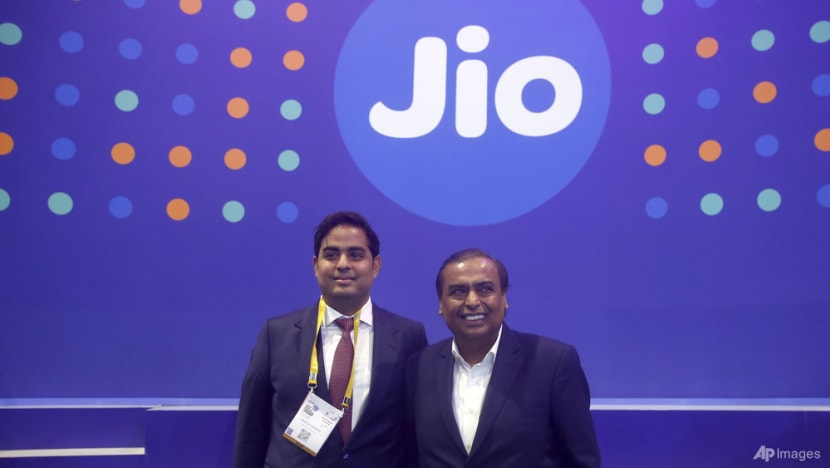India gets connected to 5G as telcos launch network trial
With faster download speeds and higher bandwidth, the next generation network is seen as essential for adopting emerging technologies like artificial intelligence and robotics.

Chairman of Reliance Industries Limited Mukesh Ambani stands with his son Akash Ambani, Chairman of Jio, at the launch of 5G services in India, in New Delhi, Saturday, Oct. 1, 2022. (Credit: AP)
INDIA: Telecom companies in India launched 5G services in several cities this month as the nation pushes towards its goal of achieving a US$1 trillion digital economy by 2025.
India is the last major Asian economy to launch its 5G network, but telecom companies are promising a rapid rollout with services that will be affordable in a country which already has some of the lowest data prices in the world.
India’s largest telecom player, Reliance Industries' Jio, on Wednesday (Oct 5) rolled out trial services in New Delhi, Mumbai, Kolkata, and Varanasi. Its rival Bharti Airtel, the country’s second-biggest operator, started its 5G services in eight cities at existing 4G rates.
5G, the fifth generation of high-speed mobile Internet, touts surfing speeds 10 times that of 4G. With faster downloads and higher bandwidth, the next generation network is seen as essential for adopting emerging technologies.
“5G is much more than the next generation of connectivity technology. It is a foundational technology that unlocks the full potential of other 21st century technologies, like artificial intelligence, Internet of Things, robotics, blockchain, and the metaverse,” said Mr Mukesh Ambani, chairman and managing director of Reliance Industries.
Sectors including education, healthcare, agriculture, and businesses could benefit from 5G as faster technology would improve the reach and efficiency of services to benefit the population, said Mr Ambani.
Jio, which has more than 420 million customers, in August topped the Government’s US$19 billion 5G spectrum auction with its offer of about US$11 billion, and has plans to pump in another US$25 billion to expand the high-speed network across India.
Jio aims to cover the entire country with its 5G services by the end of next year, while Airtel plans to do so by 2024.
However, as the world’s second biggest mobile market gets connected onto the next generation high-speed network, not everyone can get access as it requires devices that are 5G-enabled and more infrastructure to be put in place.
“For 5G to be a meaningful technology, there needs to be a lot of devices, which require that technology. We're not (just) talking about cell phones. We're talking about IoT devices, we're talking about connected driverless cars,” said Mr Utkarsh Sinha, a managing director at Bexley Advisors.
IoT refers to the Internet of Things, in which devices exchange information wirelessly and interact with other machines.
“5G is going to be an interesting and tough rollout. Simply because the 5G towers, the way that they're currently designed, they have a much lower range than 4G towers. So that means that for getting the same amount of coverage, the tower density needs to be a lot higher,” said Mr Sinha.
To facilitate and accelerate the transition into 5G, Jio is partnering Google to develop low-cost smartphones to cater to a market of more than 600 million users.















